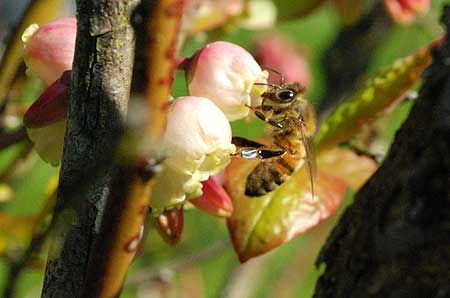May 16, 2011
Honey and Beekeeping Resources in Oregon
by Nate Rafn
Honeybees play a vital role, both in nature and in agriculture. They are responsible for pollinating many of our fruit and vegetable crops. Bees accomplish this task by flying from one flower to another, gathering nectar and pollen, then delivering the precious pollen to the flowers that need it for fertilization. The fertilized plant then produces a seed in the form of fruit, nut, or vegetable. Without bees, our food supply could be at risk on a massive scale.
In 2008, Colony Collapse Disorder (CCD) was occurring widely throughout the United States. CCD was a term given to honeybee populations that mysteriously disappeared in large quantities.
In July 2008, I spoke with Mike Rodia, hobbyist beekeeper and secretary for the Willamette Valley Beekeepers Association.
According to Rodia, CCD had not appeared in the Willamette Valley at that time.
“I don’t know of anybody locally who has experienced CCD,” said Rodia in 2008. “We all are suffering losses, because of mites or other kinds of diseases. As hobbyists, we lose two or three [hives] over the winter. Was it CCD? Well, we lose them anyway.”
Beekeepers in Oregon usually experience small losses of bees in the winter. Apiaries in other parts of the country, however, had losses exceeding fifty percent.
As Rodia points out, this problem still hits close to home.
“You have larger beekeepers losing thousands of hives. It happened in Washington State. People lost a lot of hives,” said Rodia.
At the time, Rodia highlighted several factors that could have contributed to CCD.
“We didn’t get here over night. We’ve got to develop bees that are genetically resistant to mites and viruses. However, the genetic stock of honeybees is very limited. Over the years there’s been selection of honeybees for certain traits, which were not necessarily traits for survival. The traits were generally for producing honey,” says Rodia.
“The way beekeeping is done commercially may,” Rodia stresses, “may be detrimental to bees in the long run. It’s a monoculture, where bees are shipped in to one area with one kind of crop. Pesticide use is also of great concern. Studies are being done on all the variables. Is any single one thing the answer? Probably not.”
The honeybee situation may sound complex and daunting in scope, but, according to Mike Rodia, there are things we can do individually to help.
“Plant flowers that attract bees,” Rodia exclaims. “That helps bees with their nectar source and good honey. Minimize use of pesticides,” and “to help the industry, purchase local bee products.”
With thoughtful practices and policies, the honeybee population can be preserved healthfully for years to come. The businesses listed below are good sources of local honey and/or beekeeping services.
Honey and Bee Products
Bear Mountain Honey
81888 Bear Mountain Rd. Creswell, OR
Products: Willamette Valley honey and beeswax products
Glorybee Foods
1-800-456-7923
Eugene, OR
Products: royal jelly, bee pollen, 28 varieties of honey
Lees Bees Honey
775-560-5333
92727 Cape Blanco RD Sixes, OR
Products: Oregon honey, beeswax candles
LifeSource Natural Foods
2649 Commercial St. S Salem, OR
Products: raw bulk honey, royal jelly, and bee pollen from the Willamette Valley
Oregon Mountain Wild Honey
Products: raw honey, beeswax lip balm
W.C. Kester Apiaries - Salem Public Market
Rickreall, OR
Products: Willamette Valley honey, beeswax candles
Wessels Family Honey, LLC
503-860-7040
2678 NW Stringtown Rd. Forest Grove, OR
Products: local raw honey
Beekeeping Supply and Pollination Services
Bee Way Honey Pollination Inc.
503-658-7603
17496 SE Hemrick Rd. Damascus, OR
Products: honey, pollination services
Pocket Meadow Farm
503-892-2944
Portland, OR
Products: pollination services, honey, pollen, wax, and starter colonies
Ruhl Bee Supply
503-657-5399
17845 SE 82nd Drive, Gladstone, Oregon 97027
Products: bee hives, beekeeping equipment and supplies, classes and workshops
Subscribe to:
Post Comments (Atom)
Latest Posts
Popular Posts
-
by Nate Rafn This year's Capital City Chicken Coop Tour has been scheduled for Saturday, July 21st. The self-guided tour will featu...
-
by Nate Rafn Jan Neilson, of Fraga Farm Goat Cheese , will be hosting a breakfast event on June 26th to benefit the Sweet Home Farmers...
-
by Nick Pfaff I love curry. But I especially enjoy massaman curry , which is generally made with potatoes, carrots, onions, coconut milk, ...
-
by Nate Rafn With hard economic times and frigid temperatures comes an ever increasing need for local food security. Prices for food have...
-
Every October, E.Z. Orchards invites the public to celebrate Harvestfest. This month-long event features a corn maze, pumpkin patch, pettin...
-
It's almost October and we still have raspberries. Several years ago my parents planted a raspberry bush in their backyard. It provide...







No comments:
Post a Comment